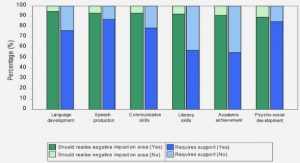Get Complete Project Material File(s) Now! »
Research Quality
Research is considered to be of good quality when it is trustworthy, which means that the research has exhibited qualities which shows that it is credible, valid and reliable (Seal, 1999). We have rigorously followed the right research standards and procedures to ensure that the research is of good quality. To highlight the attributes that we fol-lowed to ensure that our work is of good quality, we have further explained research quality in the following terms:
1. Construct Validity: Burton and Mazerolle (2011) described construct validity as the degree to which an operational measure correlates with the theoretical concept investi-gated. According to Embertson (1983, p. 197) “construct validation is involve whenever a test is to be interpreted as a measure of some attribute or quality which is not opera-tionally defined.” To ensure that the operational measure of this research correlates with the theoretical concept, we provide description of how the research questions were broken down into interviews and questionnaires.
First we describe construct validity with regards to the interviews questions. The ques-tions were designed to assess the following questions 1. What are the business values obtained from using wikis in organizations? 2. What is the impact of the CIO in creating these business values? For question Q1, the questions designed for the interview aims to capture data about the business values derived on wikis from the CIO or IT managers’ perspective. For question Q2, the interview questions designed were aimed to assess the CIOs’ impact on creating business values for the organization through wikis.
Secondly, we describe construct validity with regards to the questionnaire questions. All the questions set in the questionnaire were aimed at collecting data about business val-ues of enterprise wikis from the user’s perspective. In order to collect quality data, we deployed the theoretical concepts of IT business value and then we structured the ques-tions to cover the elements of business value. These will answer the Q2 research ques-tion from the wiki user’s perspective.
2. Internal Validity: Lincoln and Guba (1985) described internal validity as the extent to which a causal connection exists between independent and dependent variables. We have strived to achieve internal validity by ensuring that our research findings do not re-flect our own views but rather reflect the views and perspectives of the subjects we are investigating. In an effort to achieve trustworthy research, we ensured that all the empir-ical data collected have undergone thorough and thoughtful analysis before making final conclusions.
3. External Validity: External validity aims to ensure that sample taken is in accordance with the rule that every element of the population has a known probability (not neces-sarily equal) of being included in the sample (Lincoln & Guba, 1985). This further en-sures that the sample took into consideration all segments of the population and there-fore, the findings represent the entire population. Our research strived to avoid threats to external validity in order to achieve result that is generalizable to the population.
4. Reliability: Reliability shows the level of consistency of the research. This means that when you use the same variables to test our findings, you should also have a similar re-sult. Therefore, a research is reliable, when it exhibits the same level of consistency; this further shows the quality and the validity of the research (Lincoln & Guba, 1985).
Research Ethics
Research ethics addresses those rules that researchers must adhere to when conducting a research. There are several important questions that are asked when dealing with ethical issues such as, what moral principles guide your research? How do ethical issues enter into your selection of a research problem? How do ethical issues affect how you conduct your research—the design of your study, your sampling procedure, etc.? What re-sponsibility do you have toward your research subjects?
Some moral principles that must be considered when conducting a research include.
1. Confidentiality: Confidentiality has to do with the respect for autonomy. This means that “identifiable information about individuals collected during the process of research will not be disclosed without permission” (Wiles, Crow, Heath & Charles, 2008, p. 417). During our research, we collected interview data from IT managers and also collected questionnaire data from various wiki users. Our obligation is to ensure that we do not disclose any data without the permission of the subject (Callahan & Hobbs, 1998).
2. Voluntary Participation: The principle of voluntary participation requires that people are not forced into participating in research (Trochim, 2006). The participants in this re-search should be willing to take part in the research to share their experience. They are free of any coercion or promises of benefits unlikely to result from participation (Calla-han & Hobbs, 1998). It is necessary and important for us to get accrue data we needed in research. Usually, voluntary participation is related closely with informed consent we talk about next.
3. Informed Consent: It is our obligation as researchers to fully inform the respondents about the procedures and risk involved, and they must give their consent to participate (Trochim, 2006). Ethical standards require that researcher should not subject their re-spondents to any risk of harm. Risk of harm might be in form of economic losses such as loosing ones’ job, damaging one’s reputation and so on.
Reducing Bias
Sica (2006, p. 780) described bias in his report Bias in Research studies “as a form of systematic error that can affect scientific investigations and distort the measurement process”. Bias occurs in a situation where a particular research finding deviates from a ‘true’ finding. This could happen as a result of errors in the manner of interviewing or by errors in sampling. We have strived to reduce bias while conducting our research by considering scenarios where bias might occur such as selection bias (Sica, 2006). For instance, we made sure that all the interview respondents were people who manages IT/IS resources in their respective firms and have had experiences in managing wiki platforms. For the questionnaire respondents, we made sure that they are all user, col-laborators or contributors of wiki platforms.
1 Introduction
1.1 Problem Are
1.2 Purpose
1.3 Research Questions
1.4 Perspective
1.5 Delimitation
1.6 Definitions
2 Frame of Reference
2.1 Wikinomics
2.2 CIO (Chief Information Officer)
2.3 Business Value of Social Networking Technologies
3 Methodology
3.1 Research Approach
3.2 Data Collection
3.3 Data Analysis
3.4 Research Quality
3.5 Research Ethics
3.6 Reducing Bias
4 Results and Analyses
4.1 Interview Result and Analysis .
4.2 Questionnaire Result and Analysis
5 Conclusions
5.1 The Research Question
5.2 CIO / IT manager’s perspective
5.3 Wiki users’ perspectiv
6 Discussions
6.1 Limitations
6.2 Course Experience
7 Future Research
7.1 Future Research of CIO
7.2 Future Research of Wikis
8 References
9 Appendix
GET THE COMPLETE PROJECT
Enterprise wikis as a means of creating business value : The impact of the CIO






